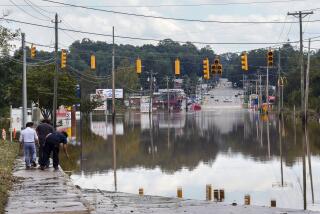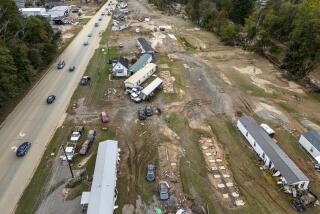Like Everyone Else, the Dead Must Wait Their Turn
- Share via
GULFPORT, Miss. — The produce truck was filled Friday with the dead, wrapped in vinyl bags.
There was no telling when they might be buried.
Hurricane Katrina destroyed funeral homes and churches all along the Gulf Coast. There are few places to hold a proper service.
And few have time for formal mourning.
Survivors spend all day scavenging for supplies to sustain themselves. They wait in line for ice, for water, for a dinner ration of boiled shrimp and chickpeas from the Salvation Army.
The morticians are busy too, too busy to prepare the bodies they collect. Every day they go out in hearses, or Chevy Suburbans, to try to extricate corpses from the rubble. Many are badly decomposed and coated in brackish mud.
The bodies are brought to a makeshift morgue set up in this smashed coastal town, on the veranda of Riemann’s Funeral Home.
Forensic pathologist Paul McGary checks them in. He hunches over a clipboard, writing names on an oversize piece of paper. When he has no name, he writes what he knows: “Unidentified white male, [town of] Pass Christian, #7.”
Those who work with the dead have gauze masks dangling around their necks; one or two even have clipped gas masks to their belts. But they don’t wear them. They have long since stopped noticing the stench. When breakfast rations arrive -- cheeseburgers and pineapple -- they sit on the veranda to eat, just a few steps from the six refrigerated trucks that vent the smell of 60 corpses.
In a disaster zone like this one, local coroners -- and the volunteers that poured in from other states to help -- are responsible only for collecting the bodies and pronouncing the victims dead. The federal government sends in special teams to declare the cause of death and notify the families.
Three federal officials had arrived here by Friday afternoon. Yet the funeral home staff complained that the bureaucracy had been too slow to grasp the magnitude of the crisis.
“The frustration level is real high,” said Jason Green, assistant manager of the funeral home. “It’s taken five days to get help, and that’s absurd.”
Wearing an aqua-colored hospital scrub, Green barked into a cellphone: “We’re in overload mode.” He pleaded for more refrigeration trucks.
In at least one of the trailers on the lawn, the bodies were stacked two and three deep, according to Sgt. Brian Stewart, a Gulfport police officer standing guard nearby.
Outside the local coroner’s office, a team of Home Depot workers was assembling a gazebo. Liz White, an official with the American Red Cross, said it would be used as a counseling station, to help victims’ relatives through their grief. But she couldn’t say when it would open.
“The waiting process is a lot longer than anyone would want,” she said.
There is still no mechanism for alerting families when a loved one is brought to the morgue. The emergency operations centers along the coast don’t have lists of all the bodies recovered. And even if a family is able to find a loved one, the funeral home directors are not authorized to release the bodies until the federal team examines them.
Joe Spraggins, a retired Air Force colonel who runs Harrison County’s emergency response, acknowledged that the wait has been tough on many families.
But he said he had many other priorities: Enforcing a 6 p.m. to 6 a.m. curfew to crack down on looting. Putting military police on the streets. Improving sanitation. Bringing in food, water and ice.
“The person who wants to pay his last respects to a loved one, that’s important,” he said. “But my goal right now is to make sure we don’t lose any more.”
Times staff writer Stephanie Simon in Denver contributed to this report.
More to Read
Sign up for Essential California
The most important California stories and recommendations in your inbox every morning.
You may occasionally receive promotional content from the Los Angeles Times.












